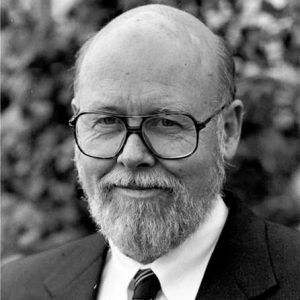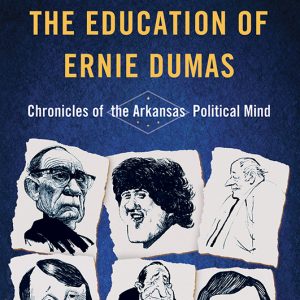calsfoundation@cals.org
Ernest Clifton (Ernie) Dumas (1937–)
Ernie Dumas was the dean of the Arkansas political press corps for most of the second half of the twentieth century. His days as a journalist extended back to high school, when he worked for the El Dorado Daily News, and he was later an associate editor and a reporter for the Arkansas Gazette and a columnist for the Arkansas Times.
Ernest Clifton Dumas was born on December 13, 1937, in El Dorado (Union County), the younger of two sons born to Joseph Clifton Dumas and Berta Canady Dumas. His mother was an educator who stopped teaching when she got married, but she taught Dumas to read before he started school and later taught his son as well. Dumas grew up in El Dorado and graduated from El Dorado High School in 1955.
At the start of his senior year in 1954, by the arrangement of his journalism teacher, he went to work as a reporter for the El Dorado Daily News. Working after school and on weekends, Dumas quickly learned about the newspaper business. After graduation in the spring of 1955, he headed off to Henderson State Teachers College (now Henderson State University) in Arkadelphia (Clark County), but he continued to work for the El Dorado paper. Coming home every Friday afternoon, he would go straight to the Daily News and work until midnight; he would work all day Saturday and Sunday before returning to school. In addition, he edited a satellite weekly, the Smackover Journal, which was owned by the owner of the El Dorado papers.
While at Henderson, Dumas served as coeditor of the college paper, the Oracle. In that role, he ran afoul of President Dean Depew (D. D.) McBrien, who, concerned about state funding, had made clear to Dumas and his colleague that he did not want to see the paper write about the unfolding crisis at Central High School in Little Rock (Pulaski County). The president thought they violated his direction with a cartoon and an editorial in the spring of 1958 that was critical of the legislature’s treatment of education, although it did not mention the desegregation controversy. McBrien threatened to suspend the editors and to halt publication of the college paper.
As a result, Dumas enrolled in the fall of 1958 at the University of Missouri (MU) in Columbia, home of the nation’s oldest journalism school. Entering as a junior, Dumas enrolled in the school of journalism. At the same time, he also enrolled in the College of Arts and Sciences, intending to major in history. However, his advisor, seeing the raft of English classes he already had in hand, convinced him to stay in English, and so in June 1960, Dumas graduated from the University of Missouri with bachelor’s degrees in both journalism and English. Part of the journalism program was writing and editing for the local daily newspaper, the Columbia Missourian, which was published by the School of Journalism. Dumas was selected as the journalism school’s outstanding graduate in 1960.
Dumas secured employment at the Arkansas Gazette while finishing school at MU. Offered the job by the managing editor at the Gazette who had previously worked for the El Dorado paper, he began on the police beat and was also a general assignment reporter covering topics such as visiting librarians coming to town, spot news, and tornadoes. In 1962, he began to cover the Arkansas General Assembly and the state political scene, and by 1964, that was his regular beat.
He married Elaine Kersey of Fox (Stone County) in June 1964, and they had one son, Christopher.
Following the closure of the Gazette in 1991, Dumas began writing for the Arkansas Times. Beyond the Gazette, his work has been featured in the New York Times, the Philadelphia Inquirer, and Newsweek. For a few years after the closure of the Gazette in 1991, Dumas also taught journalism at the University of Central Arkansas.
His years of experience made him the go-to local journalist when Bill Clinton arrived on the national scene. Dumas edited and wrote a book on the Clintons for the University of Arkansas Press, The Clintons of Arkansas: An Introduction by Those Who Know Them Best, which was published in early 1993, not long after they moved into the White House. Dumas also assisted Judge Tom Glaze with his autobiography, Waiting for the Cemetery Vote: The Fight to Stop Election Fraud in Arkansas, published in 2011. That same year, he edited Leland Duvall’s Dearest Letty: The World War II Love Letters of Sgt. Leland Duvall. Dumas published his own memoir in 2019, The Education of Ernie Dumas: Chronicles of the Arkansas Political Mind, which Arkansas Business called a “fly-on-the-wall retrospective” of state politics.
In 1999, Dumas received the Ernie Deane Award for valor in journalism from the University of Arkansas (UA) in Fayetteville (Washington County).
Dumas and his wife reside in Little Rock.
For additional information:
Dumas, Ernest. The Education of Ernie Dumas: Chronicles of the Arkansas Political Mind. Little Rock: Butler Center Books, 2019.
“Ernie Dumas.” Pryor Center for Arkansas Oral and Visual History, University of Arkansas. https://pryorcenter.uark.edu/interview.php?thisProject=Arkansas%20Memories&thisProfileURL=DUMAS-Ernie&displayName=Ernest%20Dumas&thisInterviewee=115 (accessed February 5, 2024).
Nelson, Rex. “Ernie Dumas Weighs In.” Arkansas Democrat-Gazette, June 1, 2019. https://www.arkansasonline.com/news/2019/jun/01/ernie-dumas-weighs-in-20190601/ (accessed February 5, 2024).
William H. Pruden III
Ravenscroft School



 Ernie Dumas
Ernie Dumas  The Education of Ernie Dumas
The Education of Ernie Dumas 



Comments
No comments on this entry yet.